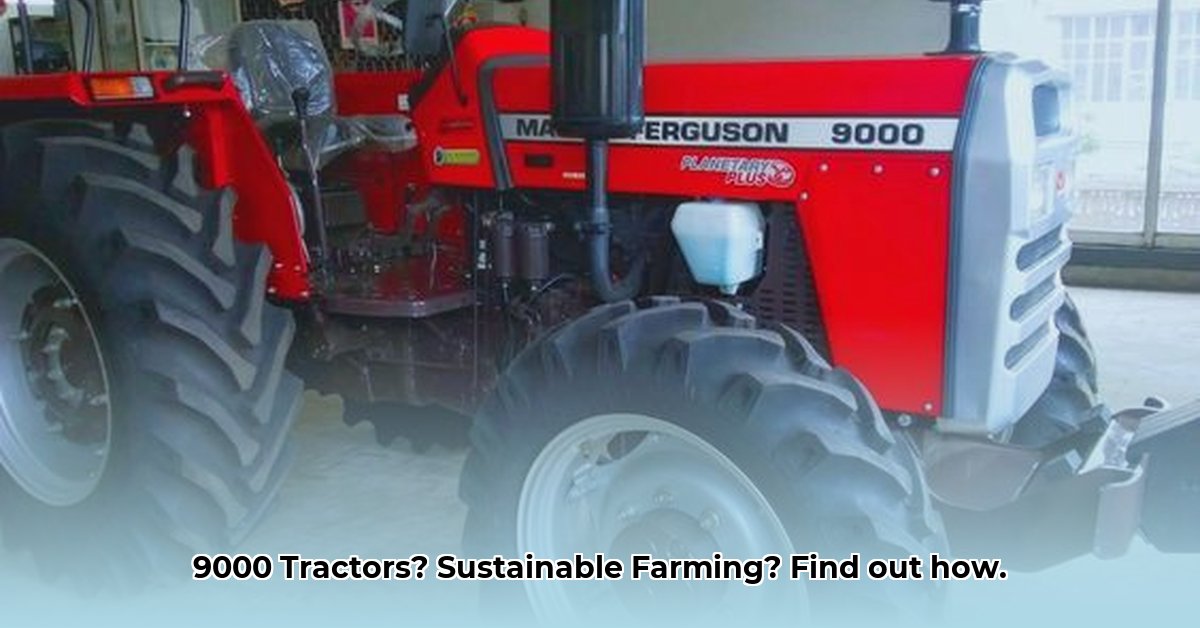
Comparing the Ford 9000 and Kubota M9000: A Sustainability Analysis
This comparative analysis examines the Ford 9000 (produced 1970-1972) and the Kubota M9000 (produced 1997-2005) tractors, focusing on their impact on sustainable farming practices. While precise comparative data is limited, analyzing fuel efficiency, technological advancements, and stakeholder impacts provides valuable insights into the evolution of sustainable agricultural machinery. For more information on tractor costs, see this resource.
Fuel Efficiency: A Cornerstone of Sustainable Agriculture
Fuel efficiency is paramount in environmentally responsible farming. While precise fuel consumption figures for direct comparison are unavailable, the Kubota M9000, with its smaller 3.3-liter four-cylinder engine compared to the Ford 9000's 6.6-liter six-cylinder engine, is highly likely to exhibit significantly better fuel economy. This translates to lower operating costs for farmers and a reduced carbon footprint. Isn't minimizing fuel usage a key element of responsible farming?
Power Delivery: Beyond Peak Horsepower
While the Ford 9000 likely boasted higher peak horsepower, the Kubota M9000's focus on efficient power delivery to the PTO and drawbar likely resulted in more effective field work. This highlights that efficient power utilization, not just raw power, is crucial for sustainable practices. How can farmers optimize power utilization to lessen fuel consumption?
Environmental Impact: A Holistic Perspective
Precise greenhouse gas emission data for a direct comparison is lacking. However, the Kubota M9000's superior fuel efficiency strongly suggests a considerably smaller carbon footprint. Further research into precise emission data is necessary for a more definitive assessment. What additional data is needed to accurately quantify the environmental impact of these tractors?
Technological Advancements and Operator Efficiency
The Kubota M9000 incorporated significant technological advancements over the Ford 9000. Features such as power shuttle transmissions and climate-controlled cabs enhanced operator comfort and reduced fatigue. These features, in turn, improved precision and efficiency, further contributing to reduced fuel consumption. How have these technological advancements influenced the trajectory of sustainable farming practices?
Stakeholder Impact: A Multi-faceted View
The impact of tractor choices extends beyond the farmer. Consider the following:
| Stakeholder | Short-Term Impacts (0-1 Year) | Long-Term Impacts (3-5 Years) |
|---|---|---|
| Farmers | Reduced fuel costs, enhanced efficiency, potential for precision farming adoption. | Transition to fuel-efficient machinery, exploration of alternative fuels, sustainable resource management adoption. |
| Manufacturers | Focus on fuel-efficient engine design, research into alternative energy sources. | Collaboration on sustainable farming practices, development of smart farm equipment, exploration of hybrid/electric options. |
| Governments/Policy | Incentives for fuel-efficient equipment, promotion of environmentally friendly farming practices. | Investment in infrastructure, stricter emission standards, support for sustainable agriculture research. |
Actionable Steps for Sustainable Fuel Management
1. Optimize Tractor Operation: Implement Gear Up and Throttle Back (GUTB) techniques and precision load matching to minimize unnecessary fuel consumption (Effectiveness varies by task and implements, but potential savings are significant).
2. Embrace Technology: Utilize precision farming tools like GPS guidance and Variable Rate Technology (VRT) for efficient resource allocation and reduced fuel use (GPS guidance can reduce fuel use by 10-15%, depending on field conditions).
3. Implement Long-Term Strategies: Establish a farm energy management system for data-driven decision-making; explore alternative fuels (biodiesel, etc.) while considering their lifecycle cost and impact (Cost/benefit analysis is crucial before large-scale adoption).
4. Prioritize Maintenance: Regular maintenance, including air filter changes and proper tire inflation, is crucial for fuel efficiency (Studies show annual savings of up to 380 liters in some cases).
Dr. Anya Sharma, Professor of Agricultural Engineering, University of California, Davis, notes, "The shift toward fuel-efficient agricultural machinery is not merely about cost savings; it's a crucial element in mitigating the environmental impact of farming and ensuring the long-term sustainability of our food systems."
This analysis highlights the significant role of technological advancements in promoting sustainable farming practices. Further research, including detailed fuel consumption and emission studies, will refine our understanding and enable more precise recommendations. However, even within the limitations of the available data, this examination underlines the critical connection between agricultural machinery choices and the pursuit of a greener future for farming.